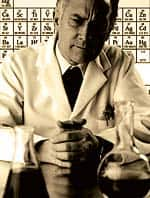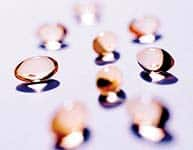Life Extension Magazine®
On November 10, 2004, researchers at the prestigious Johns Hopkins University School of Medicine released a study that startled the world. According to this report, vitamin E not only is ineffective, but also shortens the lives of those who use it.1 Since vitamin E is a popular dietary supplement, the media turned this negative report into one of the day’s top news stories. Life Extension received numerous calls seeking a rebuttal to this report that appeared to discredit the value of vitamin E. Instead of issuing an uninformed reactionary response, however, Life Extension researchers meticulously examined every detail of the report. What we found reveals that this attack on vitamin E is baseless. The main reason the media fell for this charade is that the authors of this negative report work at Johns Hopkins, a bastion of establishment medicine. Life Extension Foundation researchers were not the only ones to identify numerous flaws in the report. Other nutritional scientists inundated us with their critiques demonstrating that the claims and conclusions of this vitamin E study were unfounded. Why We Are Not BiasedThe basis for the negative attack on vitamin E was an analysis of 19 final studies evaluating the effects of various doses of alpha tocopherol on population groups. Many of the study subjects had already developed serious disease. For the past seven years, we at Life Extension have suggested that those who take only alpha tocopherol (vitamin E) might encounter health problems because alpha tocopherol displaces critically important gamma tocopherol in the body.2 In fact, since January 1, 1998, we have promoted the benefits of gamma tocopherol and have strongly urged our members to consume this form of vitamin E.3 From a standpoint of bias, it would have been in our interest to say, “look at this negative report on alpha tocopherol—we told you to take gamma tocopherol a long time ago.” While a tremendous amount of data substantiates the importance of gamma tocopherol, the negative report on alpha tocopherol emanating from Johns Hopkins still has no basis in fact.
Although scientists at Johns Hopkins concur that gamma tocopherol may be an essential form of vitamin E, this does not in any way lend credence to the horrendously flawed alpha tocopherol report released by researchers working at this same institution. Flagrant OmissionsThe Johns Hopkins vitamin E report contains so many technical flaws that its conclusions have no basis in fact.1 One of these flaws is so apparent that even someone with no understanding of molecular medicine or statistical analysis could readily recognize it. Of the thousands of human studies on vitamin E archived in the National Library of Medicine, the authors of the negative report selected just 36 studies. When they could not attribute enough deaths to vitamin E in 17 of these 36 studies, they further reduced the number of studies to be included in their analysis to only 19. Had the omitted studies been included, the Johns Hopkins researchers would not have been able to attack vitamin E as being “life shortening.” The basis for attacking vitamin E was the analysis of the remaining 19 selected studies. Based on these hand-selected studies, the Johns Hopkins researchers proclaimed that supplemental vitamin E was not effective in extending life span and may have slightly shortened it in seriously ill people. Omitted were all the positive studies showing decreases in disease risk in those taking supplemental vitamin E.4-23 Instead of raising questions about the omitted positive studies on vitamin E, the media hyped this seriously flawed report by proclaiming that experts say that vitamin E supplements should be avoided. What Experts?The Johns Hopkins report was not a new study of humans and vitamin E. Instead, it was a review of selected past studies primarily evaluating the effects of varying doses of alpha tocopherol. The majority of study subjects had already developed chronic disease, with some confined to nursing homes.
The report was published in the on-line edition of Annals of Internal Medicine, a respected medical journal. Less than a month later, however, some of the world’s best scientists had unleashed a fire-storm of criticism and rebuttals, challenging the study’s design, methodologies, selection bias, findings, and conclusions. Al-though rebuttals debunking the Johns Hopkins report were posted on the Annals of Internal Medicine’s website,1 they were completely ignored by the news media. Perhaps the media did not want the world to find out that their sensationalized reports of just a few weeks prior were baseless. Here is an excerpt from the very first rebuttal found on the Annals of Internal Medicine’s website: “The meta-analysis by Miller et al has become part of the public landscape, because of the sensational headlines in newspapers around the world: “High Doses of Vitamin E Deadly,” “Vitamin E’s Fatal Flaw,” “Lethal Consequences of Vitamin E Overdose.” The wall-to-wall press makes it seem like one of the most important health warnings of our era, but this meta-analysis is nothing more than a tempest in a teapot brewed from a statistical study that many epidemiologists would not give much credence to. For physicians (or their patients) unable to read past the alarming headlines, here’s the story: The authors combined the findings in 19 previously published studies on vitamin E over the last 12 years. Virtually all of them failed to show any statistically significant harm—much less any increase in deaths. However, by combining the 19 old studies, the authors believe they have found a statistically significant increase in deaths from all causes of mortality. I believe the authors’ bias is clear when they cite an apparent 0.4% increase in all-cause mortality at doses over 400 IU vitamin E while providing almost no comment on hundreds of excellent studies that show no increase in all-cause mortality—while also demonstrating benefits of vitamin E supplementation. Certainly as physicians assess the risk of vitamin E, its documented benefits must be factored into the equation. Yet the authors fail entirely to acknowledge the benefits of vitamin E that were reported in the very same studies that they included in their own meta-analysis: Reduction in the risk of Alzheimer’s disease, heart and blood vessel disease, age-related macular degeneration and several forms of cancer. How narrowly informed is this meta-analysis? I believe the overwhelming fact is that the increase in mortality was just 39 out of 10,000 for those taking 400 IU of vitamin E or more. That’s less than a one half of one percent increase in all-cause mortality, which may include floods, famine, earthquakes, homicides, suicides and accidents!”1 Note the significance of the last sentence above: because the Johns Hopkins study authors considered “all-cause mortality,” if a vitamin E user was murdered or died in an accident, this would have counted as a person whose life was shortened because he took vitamin E. When we say this Johns Hopkins study is baseless, we are not exaggerating!
Some Hopkins Researchers Endorse Vitamin EJohns Hopkins is a huge institution whose scientists have varying opinions about the value of supplements. Johns Hopkins, for instance, was an early pioneer in discovering the benefits of gamma tocopherol, and continues to publish research showing that this may be the preferable form of vitamin E. On January 23, 2004, the media reported that “Johns Hopkins Endorses Vitamin E for Age-Related Macular Degeneration.” This report was based on a study showing that daily doses of 400 mg of vitamin E along with vitamin C, beta-carotene, and other nutrients reduced the likelihood of the progression of a blinding eye disease. Until this study was released, there was no proven treatment to slow the progression of age-related macular degeneration (AMD).24,25 In a report published in the Archives of Ophthalmology, Johns Hopkins researchers concluded, “if every American with intermediate AMD took these vitamins and minerals, more than 300,000 people could avoid AMD-associated vision loss over the next five years.”25 More than 1.6 million Americans over the age of 60 have age-related macular degeneration, which is the most common cause of visual impairment and blindness in the US. Clearly, not all Johns Hopkins scientists are opposed to vitamin E supplements. | ||||
Why Test Vitamin E in Sick People?You may be wondering why millions of dollars were spent evaluating the effects of alpha tocopherol on people in serious disease states. Since vitamin E is not patentable, a scientific basis must exist for a grant to be awarded to fund these kinds of studies. The reasons why so many dollars have been spent to see whether individual supplements could save the lives of sick people are:
Based on studies showing beneficial effects in people who supplement with vitamin E, doctors wanted to know whether this same effect occurs in people who have already entered a state of deteriorating health. The regrettable fact is that once serious disease manifests, it takes a lot more than an alpha tocopherol supplement to give people a chance of regaining their health. Alpha tocopherol has been shown to help prevent a number of common disorders, but it is not a miracle cure, especially when taken by itself or in the form of low-potency multi-vitamins.29,30 What has been happening over the past several years is that an increasing number of studies shows that single nutrients do not provide a significant beneficial impact on existing disease. A few exceptions are studies showing that high-dose coenzyme Q10 dramatically slows the deterioration and even induces some functional improvement in those afflicted with Parkinson’s disease.31,32 Danger of Testing Single NutrientsExpecting that alpha tocopherol alone, or in combination with low doses of other nutrients, will effectively treat disease is being optimistic, to say the least. All one has to do is look at what happens when only alpha tocopherol is used in a laboratory setting, and the results are not encouraging for single-nutrient supplementation. For instance, in response to lipid peroxidation (free radical activity) that occurs on cell membranes, antioxidants like glutathione peroxidase are produced inside the cells. If one takes only alpha tocopherol, lipid peroxidation rates are suppressed in cell membranes, with a corresponding reduction in glutathione peroxidase production inside the cell. This deficiency of glutathione peroxidase makes the DNA and mitochondria inside the cells more vulnerable to free radical attack.33-35 When supplementing with selenium, however, glutathione peroxidase levels increase significantly, even with alpha tocopherol simultaneously protecting cell membranes against lipid peroxidation.36-38
Vitamin supplement users usually take selenium along with vitamin E. Seriously ill people who enroll in studies are told not to take any other supplement. These study participants are thus denied the benefit of taking the wide variety of supplements needed to protect against degenerative disease. Selenium is one of several nutrients that can enhance the effectiveness of alpha tocopherol. After alpha tocopherol is used to suppress damaging free radicals, the remnants of alpha tocopherol can themselves induce oxidative stress in the body. Nutrients like vitamin C, lipoic acid, coenzyme Q10, and gamma tocopherol can help regenerate depleted alpha tocopherol.39 Based on this understanding, it is quite easy to see why alpha tocopherol is not going to keep sick people alive longer. It also shows the fallacy of expecting any one nutrient, or low doses of several nutrients, to provide the broad-spectrum biological effects needed to maintain or regain good health. The bottom line is that serious supplement takers are simultaneously using many different nutrients to protect against the multiple mechanisms involved in the development of age-related disease. This means that a report stating that any one nutrient by itself did not achieve desired results is quite irrelevant, especially when many of the study subjects already had established disease.
How Many Lives Will Be Lost?The media has often disseminated reports that unjustly attack the value of dietary supplements. The way this flawed Johns Hopkins report has been sensationalized is perhaps more egregious than any other media distortion to date. Instead of recognizing obvious flaws in this report, the media turned it into headline news, causing widespread fear that vitamin E supplements might actually shorten life span. Never before has the public been exposed to such an outrageous farce. The result of the media’s handling of this flawed study will be that many people will be duped into believing that there is no value to supplements. Yet even the researchers who authored this study admit that it has no relevance to what healthy people should do to prevent disease. Of the many rebuttal articles Life Extension received concerning this flawed vitamin E study, we have chosen to publish the following article that provides a little humor regarding what regrettably will someday be recognized as an unfortunate event that will cost the lives of people who put too much faith in news media headlines. | |||||
| References | |||||
1. Available at: http://www.annals.org/cgi/content/full/0000605-200501040-00110v1. Accessed December 22, 2004. 2. Huang HY, Appel LJ. Supplementation of diets with alpha-tocopherol reduces serum concentrations of gamma- and delta-tocopherol in humans. J Nutr. 2003 Oct;133(10):3137-40. 3. Not all vitamin E is created equal. Life Extension. February 1998. 4. Losonczy KG, Harris TB, Havlik RJ. Vitamin E and vitamin C supplement use and risk of all-cause and coronary heart disease mortality in older persons: the Established Populations for Epidemiologic Studies of the Elderly. Am J Clin Nutr. 1996 Aug;64(2):190- 6. 5. Seth RK, Kharb S. Protective function of alpha-tocopherol against the process of cataractogenesis in humans. Ann Nutr Metab. 1999;43(5):286-9. 6. Stampfer MJ, Hennekens CH, Manson JE, et al. Vitamin E consumption and the risk of coronary disease in women. N Engl J Med. 1993 May 20;328(20):1444-9. 7. Zandi PP, Anthony JC, Khachaturian AS, et al. Reduced risk for Alzheimer disease in users of antioxidant vitamin supplements: the Cache County Study. Arch Neurol. 2004 Jan;61(1):82-8. 8. Rimm EB, Stampfer MJ, Ascherio A, Giovannucci E, Colditz GA, Wilett WC. Vitamin E consumption and the risk of coronary heart disease in men. N Engl J Med. 1993 May 20;328(20):14550-6. 9. Walda IC, Tabak C, Smit HA, et al. Diet and 20-year chronic obstructive pulmonary disease mortality in middle-aged men from three European countries. Eur J Clin Nutr. 2002 Jul;56(7):638-43. 10. Semba RD, Blaum C, Guralnik JM, Moncrief DT, Ricks MO, Fried LP. Carotenoid and vitamin E status are associated with indicators of sarcopenia among older women living in the community. Aging Clin Exp Res. 2003 Dec;15(6):482-7. 11. Nagle CM, Purdie DM, Webb PM, Green A, Harvey PW, Bain CJ. Dietary influences on survival after ovarian cancer. Int J Cancer. 2003 Aug 20;106(2):264-9. 12. Heinonen OP, Albanes D, Virtamo J, et al. Prostate cancer and supplementation with alpha-tocopherol and beta-carotene: incidence and mortality in a controlled trial. J Natl Cancer Inst. 1998 Mar 18;90(6):440-6. 13. Kline K, Yu W, Sanders BG. Vitamin E and breast cancer. J Nutr. 1998 Mar 18;90(6): 440-6. 14. Salonen RM, Nyyssonen K, Kaikkonen J, et al. Six-year effect of combined vitamin C and E supplementation on atherosclerotic progression. Circulation. 2003 Feb 25;107(7):947-53. 15. Hercberg S, Galan P, Preziosi P, et al. The SU.VI.MAX Study: a randomized, placebo-controlled trial of the health effects of antioxidant vitamins and minerals. Arch Intern Med. 2004 Nov 22;164(21):2335-42. 16. Wright ME, Mayne ST, Stolzenberg-Solomon RZ, et al. Development of a comprehensive dietary antioxidant index and application to lung cancer risk in a cohort of male smokers. Am J Epidemiol. 2004 Jul 1;160(1):68-76. 17. Palan PR, Woodall AL, Anderson PS, Mikhail MS. Alpha-tocopherol and alpha tocopherol quinone levels in cervical intraepithelial neoplasia and cervical cancer. Am J Obstet Gynecol. 2004 May;190(5):1407-10. 18. Chan AC. Vitamin E and atherosclerosis. J Nutr. 1998 Oct;128(10):1593-6. 19. Fleischauer AT, Simonsen N, Arab L. Antioxidant supplements and risk of breast cancer recurrence and breast cancer-related mortality among postmenopausal women. Nutr Cancer. 2003;46(1):15-22. 20. Bonilla-Fernandez P, Lopez-Cervantes M, Torres-Sanchez LE, Tortoler-Luna G, Lopez-Carrillo L. Nutritional factors and breast cancer in Mexico. Nutr Cancer. 2003;45(2):148-55. 21. Ryglewicz D, Rodo M, Kunicki PK, et al. Plasma antioxidant activity and vascular dementia. J Neurol Sci. 2002 Nov 15;203- 204:195-7. 22. Jacobs EJ, Henion AK, Briggs PJ, et al. Vitamin C and vitamin E supplement use and bladder cancer mortality in a large cohort of US men and women. Am J Epidemiol. 2002 Dec 1;156(11):1002-10. 23. Nathens AB, Neff MJ, Jurkovich GJ, et al. Randomized, prospective trial of antioxidant supplementation in critically ill surgical patients. Ann Surg. 2002 Dec;236(6):814-22. 24. Bressler S. Health after 50. Johns Hopkins School of Medicine newsletter. February 2004. 25. Clemons TE, Kurinij N, Sperduto RD. Associations of mortality with ocular disorders and an intervention of high-dose antioxidants and zinc in the Age-Related Eye Disease Study: AREDS Report No. 13. Arch Ophthalmol. 2004 May;122(5):716-26. 26. Machlin LJ. Critical assessment of the epidemiological data concerning the impact of antioxidant nutrients on cancer and cardiovascular disease. Crit Rev Food Sci Nutr. 1995 Jan;35(1-2):41-50. 27. Frei B. Efficacy of dietary antioxidants to prevent oxidative damage and inhibit chronic disease. J Nutr. 2004 Nov;134(11):3196S-8S. 28. De la FM. Effects of antioxidants on immune system ageing. Eur J Clin Nutr. 2002 Aug;56 Suppl 3S5-S8. 29. Ricciarelli R, Zingg JM, Azzi A. Vitamin E: protective role of a Janus molecule. FASEB J. 2001 Nov;15(13):2314-25. 30. Winklhofer-Roob BM, Rock E, Ribalta J, Shmerling DH, Roob JM. Effects of vitamin E and carotenoid status on oxidative stress in health and disease. Evidence obtained from human intervention studies. Mol Aspects Med. 2003 Dec;24(6):391-402. 31. Muller T, Buttner T, Gholipour AF, Kuhn W. Coenzyme Q10 supplementation provides mild symptomatic benefit in patients with Parkinson’s disease. Neurosci Lett. 2003 May 8;341(3):201-4. 32. Shults CW, Oakes D, Kieburtz K, et al. Effects of coenzyme Q10 in early Parkinson disease: evidence of slowing of the functional decline. Arch Neurol. 2002 Oct;59(10):1541-50. 33. Seven A, Guzel S, Seymen O, et al. Effects of vitamin E supplementation on oxidative stress in streptozotocin induced diabetic rats: investigation of liver and plasma. Yonsei Med J. 2004 Aug 31;45(4):703-10. 34. Fridovich I. In: Free Radicals in Biology. New York: Academic Press; 1976. 35. Matsuo M, Gomi F, Dooley MM. Age-related alterations in antioxidant capacity and lipid peroxidation in brain, liver, and lung homogenates of normal and vitamin E-deficient rats. Mech Ageing Dev. 1992 Jul 15;64(3):273-92. 36. Sneddon AA, Wu HC, Farquharson A, et al. Regulation of selenoprotein GPx4 expression and activity in human endothelial cells by fatty acids, cytokines and antioxidants. Atherosclerosis. 2003 Nov;171(1):57-65. 37. Actis-Goretta L, Carrasquedo F, Fraga CG. The regular supplementation with an antioxidant mixture decreases oxidative stress in healthy humans. Gender effect. Clin Chim Acta. 2004 Nov;349(1-2):97-103. 38. Nagyova A, Krajcovicova-Kudlackova M, Horska A et al. Lipid peroxidation in men after dietary supplementation with a mixture of antioxidant nutrients. Bratisl Lek Listy. 2004;105(7-8):277-280. 39. Liebler DC. The role of metabolism in the antioxidant function of vitamin E. Crit Rev Toxicol. 1993;23(2):147-69. |






